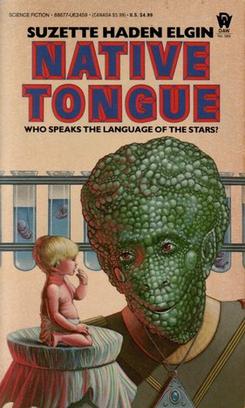 First edition | |
| Author | Suzette Haden Elgin |
|---|---|
| Cover artist | Jill Bauman |
| Language | English |
| Series | Native Tongue |
| Genre | Science fiction |
| Publisher | DAW Books |
Publication date | 1984 |
| Publication place | United States |
| Media type | Print (hardback & paperback) |
| Pages | 320 |
| ISBN | 0-87997-945-3 |
| OCLC | 44270270 |
| 813/.54 21 | |
| LC Class | PS3555.L42 N38 2000 |
| Followed by | The Judas Rose |
Native Tongue is a 1984 feminist science fiction novel by American writer Suzette Haden Elgin, the first book in her series of the same name. The trilogy is centered in a future dystopian American society where the 19th Amendment was repealed in 1991 [1] and women have been stripped of civil rights. A group of women, part of a worldwide group of linguists who facilitate human communication with alien races, create a new language for women as an act of resistance. Elgin created that language, Láadan, and instructional materials are available.